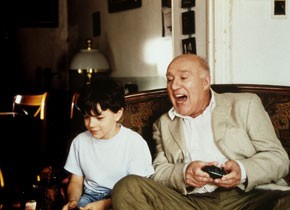Manoel de Oliveira
The Music of Vanished Things
November 13 to 30, 2015
When Manoel de Oliveira died in the spring of this year, he was busy preparing a new project. What else would one be doing at the age of 106 besides simply making another film? Especially if one's career only got started at an age when most people are retiring...
However, De Oliveira was an icon not only because of his age. His work is rich in connections to the history and literature of his Portuguese homeland, and it marked one of those unique and often baffling positions in modern cinema that the European film industry has tolerated less and less over the past 30 years. With his debut feature from 1942, De Oliveira was one of the first to represent this kind of cinema – and he will also have been one of the last.
For Manoel De Oliveira, born in Porto in 1908, things happened a little differently than in most other directing careers. His first film, a silent study from 1931, was a thoughtful portrait of his hometown and its river (Douro Faina Fluvial), but it took until his third feature in the early 1970s, O Passado e o Presente, that he began to regularly produce full-length works. In the intervening four decades, he was mainly an "amateur" – his central occupation was the family business while he also cultivated hobbies such as auto racing. Added to this was the Salazar regime, which De Oliveira did not want to involve himself with more than was necessary. As a member of the elite, a dandy and a Catholic-conservative modernist, he found the local fascists suspect and reprehensible. Like the short film A Caça (1963), his first two features – the proto-neorealistic children's fable Aniki Bóbó (1942) and the colorful passion play Acto da Primavera (1963) – can be read as critiques of this state and its cinematic self-portraits.
When he achieved his international breakthrough with the ironic adaptation of Camilo Castelo Branco's classic, Amor de Perdição (1979), Manoel de Oliveira was about 70 years old. Not long after, he began to be honored for his life's work – with the assumption that he would probably soon pass away. It seems that he, himself, didn’t expect to live very long, because by 1982 he had already created his cinematic will and testament, Visita ou Memórias e Confissões, that he insisted be shown only after his death (it premiered in May 2015 at the Cannes Film Festival). In the 1990s, however, he found a producer, Paulo Branco, who would transform De Oliveira into an international “institution”, enabling him to make a new movie almost every year – often featuring major stars such as Catherine Deneuve, Michel Piccoli, Marcello Mastroianni, Irene Papas and John Malkovich.
And the director grew as possibilities grew around him. As his composer once said: For De Oliveira each film must offer something new – an experiment, a new beginning, an adventure. Which is also why his works cannot be reduced to a common denominator. In his films one can find mighty melodramas like Francisca or Vale Abraão, as well as cryptic-crafty comedies (Je rentre à la maison, Singularidades de uma Rapariga Loura), poetic essays (Porto da Minha Infância) and cinephile games (Belle toujours). The soundings of his own position in the world (Viagem ao Princípio do Mundo) are juxtaposed with musings on the fate of Portugal („Non“, ou A vã Glória de Mandar) – where Portugal for him represented the old world: Europe. He also loved to change style and intonation, mood and bearing, often right in the middle of a film. With De Oliveira one must always be prepared for anything, and should never assume where the journey might end.
Manoel de Oliveira was an exception, a deviation beyond compare: always both old and young at the same time, a citizen of a lost era and of one yet to come. "In life, a loss always means a new beginning. Art is then no more than the 'music of vanished things.'"
The homage to Manoel de Oliveira is a joint venture between the Film Museum and the Viennale and has been organized with the generous support of the Cinemateca Portuguesa. Filmmaker Pedro Costa was invited by the Viennale to select films from De Oliveira's vast oeuvre. After the festival, these are also shown at the Film Museum, complimented by several additional works. In total, the exhibition will screen 25 short and feature-length films. On November 13 and 14, José Manuel Costa, Director of the Cinemateca Portuguesa, will speak at the Filmmuseum, discussing and introducing several films by De Oliveira.
